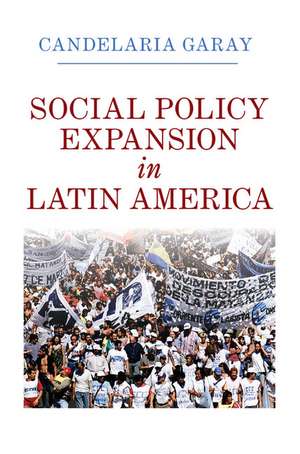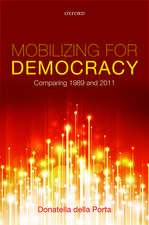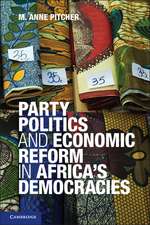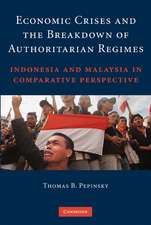Social Policy Expansion in Latin America
Autor Candelaria Garayen Limba Engleză Paperback – 28 dec 2016
| Toate formatele și edițiile | Preț | Express |
|---|---|---|
| Paperback (1) | 274.49 lei 6-8 săpt. | |
| Cambridge University Press – 28 dec 2016 | 274.49 lei 6-8 săpt. | |
| Hardback (1) | 725.14 lei 6-8 săpt. | |
| Cambridge University Press – 29 ian 2017 | 725.14 lei 6-8 săpt. |
Preț: 274.49 lei
Nou
Puncte Express: 412
Preț estimativ în valută:
52.52€ • 55.13$ • 43.60£
52.52€ • 55.13$ • 43.60£
Carte tipărită la comandă
Livrare economică 10-24 aprilie
Preluare comenzi: 021 569.72.76
Specificații
ISBN-13: 9781316606407
ISBN-10: 1316606406
Pagini: 406
Dimensiuni: 152 x 229 x 23 mm
Greutate: 0.56 kg
Editura: Cambridge University Press
Colecția Cambridge University Press
Locul publicării:New York, United States
ISBN-10: 1316606406
Pagini: 406
Dimensiuni: 152 x 229 x 23 mm
Greutate: 0.56 kg
Editura: Cambridge University Press
Colecția Cambridge University Press
Locul publicării:New York, United States
Cuprins
1. Including outsiders in Latin America; 2. Explaining social policy expansion and policy models; 3. The social policy divide in Latin America; 4. Social mobilization, electoral competition for outsiders and inclusive social policy in Brazil; 5. Social mobilization and inclusive social policy in Argentina; 6. Electoral competition for outsiders, conservative power and restrictive social policy in Mexico; 7. Electoral competition for outsiders, conservative power and restrictive social policy in Chile; 8. Social policy expansion in comparative perspective; Appendices; Bibliography; References; Index.
Recenzii
'The extension of social welfare programs to previously excluded groups has been one of the most important public policy changes in Latin America in recent decades. Candelaria Garay has written a path-breaking book that explains how that change occurred and why policy coverage continues to vary from one country to another. Most important, she explains how the content and reach of social policies are influenced by democratic competition and social mobilization from below. This is an original and deeply insightful book that makes a major contribution to the study of social policy in the developing world.' Kenneth Roberts, Cornell University
'This path-breaking book is a must-read that will reshape the discussion of Latin American politics and social policy more generally. It illuminates a dramatic process of inclusion of outsiders in the Latin American informal sector through non-contributory policies and distinct processes of political incorporation in the administration of these new policy tools during the new millennium. Garay shows how these social policies contributed to reshaping a political arena, previously defined by the entrance of formal workers into the political system during the postwar era. Moreover, the combined focus on redistribution and control in the analysis of non-contributory policies targeted to outsiders will reshape the debates of the literature on social policy and the transformations of welfare regimes in diverse regions of the world.' Maria Victoria Murillo, Columbia University
'This book examines the most important social policy development in Latin America in decades: the extension of welfare states to cover 'outsiders,' or informal sector and rural workers who constitute a majority of most Latin American workforces, and yet they have historically been denied access to health care, pensions, and other basic social benefits in most of the region. Now they are being included and Garay tells us why and how this dramatic change occurred. Theoretically rich and empirically rigorous, Social Policy Expansion in Latin America explains why social policy expanded more dramatically in some Latin America countries than in others. Garay's book makes a major contribution to research on comparative social policy in Latin America. It will be widely read, assigned and cited.' Steven Levitsky, Harvard University
'Candelaria Garay's masterful book stands out in the expanding scholarship on welfare states in Latin America for its empirical depth, comparative breadth and theoretical ambition. The novel argument is that democracy works to expand welfare policies, even in right wing governments, but in particular ways that depend on the dynamics of electoral contention and mobilization of social movements. This is a model for comparative research.' Ben Ross Schneider, Massachusetts Institute of Technology
'Social Policy Expansion is a remarkable book. Garay examines the dramatic extension of welfare provision to the informal sector - a compelling topic for Latin America and far beyond. Her unique, hard-won data reveals striking contrasts among national trajectories, yielding a novel typology of policy regimes. This is a major contribution to comparative social science.' David Collier, Robson Professor, University of California, Berkeley
'The book is particularly noteworthy because it contradicts the predominant view in contemporary political science that emphasizes patronage and clientelism as the key determinants for understanding social policy provision in Latin America. Future scholars seeking to understand social policies and their effects in Latin America will have to reconcile their theories and results with the powerful arguments advanced in this volume by having to consider how the transition to democracy influences welfare state developments differently depending on political context.' Lorena Barberia, ReVista
'This path-breaking book is a must-read that will reshape the discussion of Latin American politics and social policy more generally. It illuminates a dramatic process of inclusion of outsiders in the Latin American informal sector through non-contributory policies and distinct processes of political incorporation in the administration of these new policy tools during the new millennium. Garay shows how these social policies contributed to reshaping a political arena, previously defined by the entrance of formal workers into the political system during the postwar era. Moreover, the combined focus on redistribution and control in the analysis of non-contributory policies targeted to outsiders will reshape the debates of the literature on social policy and the transformations of welfare regimes in diverse regions of the world.' Maria Victoria Murillo, Columbia University
'This book examines the most important social policy development in Latin America in decades: the extension of welfare states to cover 'outsiders,' or informal sector and rural workers who constitute a majority of most Latin American workforces, and yet they have historically been denied access to health care, pensions, and other basic social benefits in most of the region. Now they are being included and Garay tells us why and how this dramatic change occurred. Theoretically rich and empirically rigorous, Social Policy Expansion in Latin America explains why social policy expanded more dramatically in some Latin America countries than in others. Garay's book makes a major contribution to research on comparative social policy in Latin America. It will be widely read, assigned and cited.' Steven Levitsky, Harvard University
'Candelaria Garay's masterful book stands out in the expanding scholarship on welfare states in Latin America for its empirical depth, comparative breadth and theoretical ambition. The novel argument is that democracy works to expand welfare policies, even in right wing governments, but in particular ways that depend on the dynamics of electoral contention and mobilization of social movements. This is a model for comparative research.' Ben Ross Schneider, Massachusetts Institute of Technology
'Social Policy Expansion is a remarkable book. Garay examines the dramatic extension of welfare provision to the informal sector - a compelling topic for Latin America and far beyond. Her unique, hard-won data reveals striking contrasts among national trajectories, yielding a novel typology of policy regimes. This is a major contribution to comparative social science.' David Collier, Robson Professor, University of California, Berkeley
'The book is particularly noteworthy because it contradicts the predominant view in contemporary political science that emphasizes patronage and clientelism as the key determinants for understanding social policy provision in Latin America. Future scholars seeking to understand social policies and their effects in Latin America will have to reconcile their theories and results with the powerful arguments advanced in this volume by having to consider how the transition to democracy influences welfare state developments differently depending on political context.' Lorena Barberia, ReVista
Notă biografică
Descriere
This book provides a novel explanation of widespread social policy expansion in Latin America beginning in the 1990s.















